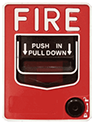Video MGMT System
 Access Control
Access Control
Voice & Data Wiring
 Burglar Alarm
Burglar Alarm
 Fire Alarm
Fire Alarm
Video MGMT System
Voice & Data Wiring
THOUGHT CENTER > Blog > Security Cameras
March 12, 2024
Mammoth Takeaways
In the era of digital advancements, the role of security cameras in safeguarding businesses cannot be overstated.
Think about it:
Having visible security cameras can dramatically reduce the risk of break-ins, which are more than 60% of all business burglaries.
But that's not all. Have you considered the impact of vandalism?
It's more than just a nuisance; it comes with a hefty price tag, averaging about $3,370 per incident.
Now, pause for a moment. The financial hit from vandalism, burglaries, and other crimes is a heavy burden for businesses without surveillance cameras in place.
So, let’s dive into the top five reasons why installing security cameras is not just a good move but a crucial strategy for any business.
Strategically placed security cameras in high-risk areas of your business, such as near cash registers, entry and exit points, or inventory storage rooms, offer an enhanced layer of protection.
These areas, due to their nature, attract a higher likelihood of theft or unauthorized access. By ensuring these zones are under constant surveillance, business owners can monitor for suspicious activities in real-time and deter potential thieves.
The added security protects the business's tangible assets and instills a sense of safety among employees and customers alike.
Security cameras act as a significant deterrent against potential criminal activities, notably theft and vandalism. Their visible presence alone can make would-be criminals think twice before committing unlawful acts, knowing their actions could be recorded and used against them in legal proceedings.
Surveillance is especially crucial for small businesses. For example, statistics indicate that smaller businesses, particularly those with fewer than 100 employees, are at a higher risk of employee theft than midsize and large businesses. In fact, 80% of internal theft occurs in small businesses and organizations.
Monitoring ensures that employees are more likely to focus on their tasks, knowing their actions are being observed.
This not only boosts operational efficiency but also contributes to a safer working environment.
Additionally, surveillance can aid in better workflow monitoring and deter employee-related incidents such as theft or harassment, thereby fostering a more secure and efficient workplace atmosphere.
Whether it's a misunderstanding between staff members or a grievance lodged by a customer, the unbiased eye of a surveillance camera provides clear evidence to address the matter promptly and justly.
This not only aids in reaching fair conclusions but also in maintaining harmony and trust.
The advent of modern security camera systems comes with the indispensable benefit of remote access.
This feature allows business owners and authorized personnel to monitor their premises in real-time from any location using devices such as smartphones, tablets, or computers.
Real-time access to surveillance feeds leads to quicker responses to security incidents, enhanced overall safety, and peace of mind for business owners.
Furthermore, the ability to remotely access surveillance footage aids in the immediate investigation of incidents, allowing for swift decision-making and action, thereby minimizing losses.
There are many different types of security cameras, each designed with different strengths to enable comprehensive business surveillance.
Bullet cameras are easily recognizable by their cylindrical shape, ideal for outdoor use with a long-range viewing capability. They're great for monitoring specific areas like parking lots.
Also known as eyeball cameras, turret cameras offer a ball-and-socket design allowing for greater freedom of movement. They're versatile for indoor and outdoor settings, providing clear images with minimal glare.
Dome cameras feature a discreet, dome-shaped design—offering a more secure environment as they’re hard to tamper with. They're suitable for indoor retail spaces.
Multi-sensor cameras have multiple lenses in a single housing, providing wide-angle views and covering large areas with fewer devices. They're perfect for covering large areas like shopping centers and parking lots.
PTZ (Pan-Tilt-Zoom) cameras offer remote directional and zoom control, making them ideal for areas requiring active monitoring and the ability to follow movement across a large area.
Facial recognition cameras use advanced algorithms to identify individuals, enhancing security by alerting when watch-listed or trespassed persons enter the premises. These cameras are useful in high-security areas and for tracking customer behavior in stores.
Consider what areas of your business need monitoring and what type of security threat you are most concerned about. This will help determine the number and types of cameras you need.
Opt for cameras that offer high-resolution footage and wide-angle lenses for comprehensive coverage. Advanced features like motion detection can add further value.
For maximum effectiveness, choose cameras that can integrate with your existing security systems, such as alarm systems or access control systems.
Be aware of the legal implications of installing security cameras. Ensure compliance with privacy laws and clearly inform your employees and customers about the presence of cameras.
Proper placement and regular maintenance of your security cameras are crucial for their effectiveness. Ensure cameras cover strategic areas and are regularly checked for any technical issues.
Security camera integrations enhance surveillance capabilities by linking cameras with other security systems, such as alarm systems and access control systems.
This interconnected approach allows for a more comprehensive security solution, enabling real-time alerts, automated responses to incidents, and streamlined monitoring across different platforms.
What’s more, by integrating cameras with business analytics tools, companies can also gain insights into customer behavior, operational efficiency, and more, making security systems a valuable asset beyond mere surveillance.
Installing security cameras in your business is not just about surveillance; it's about creating a secure environment so your business can thrive.
With the right setup, you can protect your assets, ensure the safety of your employees and customers, and gain valuable insights into your daily operations.
For a free site survey and consultation from a Mammoth Security expert, just give us a call or click to contact us and fill out the form.
NOT COMPLETELY SURE?
860-748-4292Yes, many insurance companies offer reduced premiums to businesses with security systems, including cameras, as they significantly lower the risk of theft and damage.
Most modern security systems offer remote access through apps or web portals, allowing you to monitor your business from anywhere.
While security cameras enhance safety, it's important to balance this with privacy rights. Cameras
By serving as a strong deterrent, security cameras prevent theft and vandalism, particularly in smaller businesses that are more vulnerable. Their visible installation reduces crime rates and protects businesses from financial losses due to vandalism.
Yes, security cameras can boost employee productivity. Knowing that their actions are being monitored, employees are more likely to focus on their tasks, contributing to a safer and more efficient workplace environment.
Monitoring high-risk areas like cash registers and stock rooms with security cameras enhances protection, deters potential thieves, and allows business owners to monitor suspicious activities in real time, safeguarding both tangible assets and ensuring the safety of employees and customers.
Remote monitoring allows business owners and authorized personnel to watch over their premises in real-time from any location, leading to quicker responses to incidents, enhanced safety, and peace of mind, regardless of their physical presence.
Security cameras provide clear, unbiased evidence that can quickly resolve disputes between staff members or customer grievances, aiding in reaching fair conclusions and maintaining harmony within the business environment.
Businesses should assess their specific needs, opt for high-resolution and wide-angle lens cameras, choose cameras that can integrate with existing security systems, and be aware of legal considerations to ensure compliance with privacy laws.
Installing security cameras in businesses deters theft and vandalism, boosts employee productivity, resolves disputes, monitors high-risk areas, and provides remote access to surveillance, enhancing overall security and peace of mind for business owners.